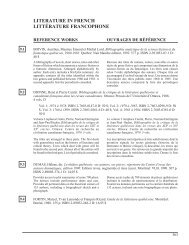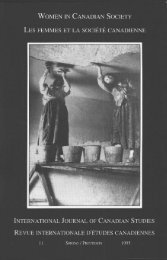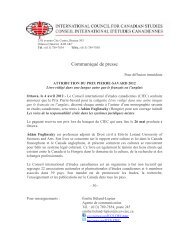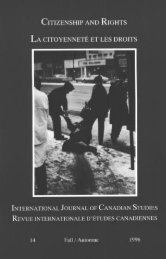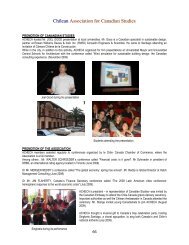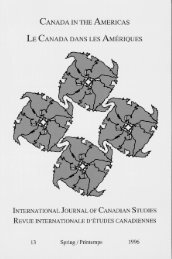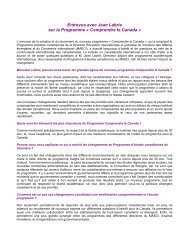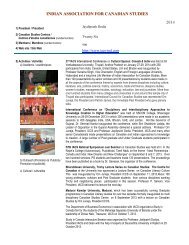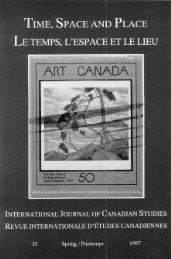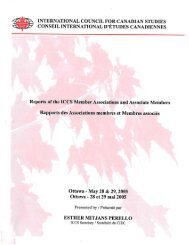Arts and Literature in Canada:Views from Abroad, Les arts et la ...
Arts and Literature in Canada:Views from Abroad, Les arts et la ...
Arts and Literature in Canada:Views from Abroad, Les arts et la ...
- No tags were found...
Create successful ePaper yourself
Turn your PDF publications into a flip-book with our unique Google optimized e-Paper software.
Zon<strong>in</strong>g <strong>Canada</strong>’s Zeitgeistspecu<strong>la</strong>tion <strong>in</strong> textual analysis, <strong>and</strong> demonstrates the value of establish<strong>in</strong>gd<strong>et</strong>ailed re<strong>la</strong>tionships b<strong>et</strong>ween historical conditions <strong>and</strong> cultural analysis. Lik<strong>et</strong>he other two works discussed, Söderl<strong>in</strong>d emphasizes cultural analysis as aliterary project <strong>and</strong>, like them, illustrates how political power affects <strong>la</strong>nguage<strong>and</strong> structures hierarchies. Each stresses marg<strong>in</strong>ality, see<strong>in</strong>g <strong>in</strong> both postmodernism<strong>and</strong> post-colonialism a practice <strong>and</strong> aesth<strong>et</strong>ics situated on theedges. And each underst<strong>and</strong>s some of the connections b<strong>et</strong>ween ideologicaldefiance <strong>and</strong> literary subversion.Söderl<strong>in</strong>d is, however, particu<strong>la</strong>rly concerned with substantiat<strong>in</strong>g differencesb<strong>et</strong>ween the literatures of English <strong>Canada</strong> <strong>and</strong> Québec <strong>and</strong>, more so than theother two works, hers specifies rh<strong>et</strong>orical devices <strong>and</strong> representational stancesthat result <strong>from</strong> a read<strong>in</strong>g of post-colonialism as rooted <strong>in</strong> <strong>la</strong>nguage. She doesnot specifically address canon formation, nor does she make broad c<strong>la</strong>ims forthe significance of post-colonialism to current critical practice. Some of herconclusions are open to debate: that literary <strong>and</strong> political radicalism may work<strong>in</strong> opposition; that the author’s re<strong>la</strong>tionship to the nation may d<strong>et</strong>erm<strong>in</strong>e thework’s degree of post-modernism or post-colonialism; that <strong>in</strong> Anglophone<strong>Canada</strong>, marg<strong>in</strong>ality is an aesth<strong>et</strong>ic choice rather than a political reality.Nevertheless, they are clearly significant issues. She <strong>in</strong>troduces gender <strong>from</strong> aperspective that differs <strong>from</strong> much fem<strong>in</strong>ist theory. See<strong>in</strong>g that the m<strong>et</strong>aphorof rape as it appears <strong>in</strong> the novels she discusses necessarily marg<strong>in</strong>alizeswomen, she also admits that her choice of books by male writers emphasizes apatriarchal ideology that, ironically, puts her <strong>in</strong> the mascul<strong>in</strong>e position ofparticipat<strong>in</strong>g, as a reader, <strong>in</strong> each novel’s sado-masochistic dynamics.Marg<strong>in</strong>/Alias, then, concentrates on demonstrat<strong>in</strong>g <strong>in</strong> careful d<strong>et</strong>ail a specificperiod of history as reflected <strong>in</strong> the <strong>la</strong>nguage of five particu<strong>la</strong>r novels, whileboth Canadian Canons <strong>and</strong> Past the Last Post present arguments moregenerally meant to problematize current post-colonial theory <strong>and</strong> criticism.Tog<strong>et</strong>her, however, they suggest an <strong>in</strong>creas<strong>in</strong>gly political agenda for Canadianl<strong>et</strong>ters. Brydon writes <strong>in</strong> Past the Last Post: “Far <strong>from</strong> separat<strong>in</strong>g it <strong>from</strong> otherpost-colonial nations, <strong>Canada</strong>’s pluri-<strong>et</strong>hnic composition allows for po<strong>in</strong>ts ofconnection with some experiences elsewhere which when analysedcomparatively may yield <strong>in</strong>sights <strong>in</strong>to how power operates, other than by sheerforce, <strong>in</strong> our own fairly comfortable world” (195). Look<strong>in</strong>g b<strong>et</strong>ween <strong>and</strong>beyond <strong>Canada</strong>’s borders, the arguments presented <strong>in</strong> all three booksparticipate, as Lecker <strong>in</strong>sists Canadian criticism must, <strong>in</strong> the “necessaryprocess of undo<strong>in</strong>g” (16). Söderl<strong>in</strong>d implies that multi-culturalism, with itsvariation of <strong>la</strong>nguages, necessarily d<strong>et</strong>racts <strong>from</strong> territorialism. Other criticsassert that multi-culturalism may encourage an <strong>in</strong>terpr<strong>et</strong>ation of postcolonialismmore global than nationalistic. Most important, however, is thatsuch controversies about identity <strong>and</strong> power cont<strong>in</strong>ue, <strong>and</strong> that critics developa wide range of approaches to Canadian <strong>and</strong> Québécois literatures <strong>in</strong> a NorthAmerica <strong>in</strong> which the North is all too often ignored compl<strong>et</strong>ely.159



